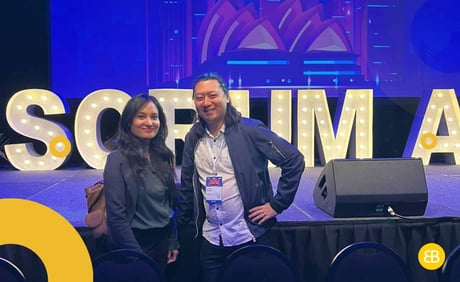Table of Contents
I recently had the opportunity to participate in the 2-day conference Scrum Australia 2023 (30 and 31 March 2023), an annual conference dedicated to exploring and sharing best practices in agile project management. One of the highlights of the event was the keynote presentation by Lyssa Adkins, titled "The Agilists Emerging Superpower and Our Planetary Challenge." Adkins' talk focused on the evolution of organizational theory and the role that agile practices can play in addressing our global challenges.
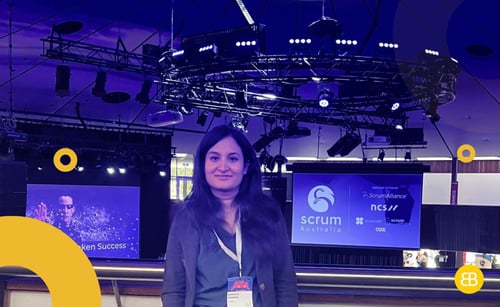
The Agilists Emerging Superpower and Our Planetary Challenge
Adkins began by discussing the traditional view of organisations as machines. This view, which dominated management theory for much of the 20th century, held that organisations could be optimised through precise planning and control. However, as Adkins noted, this approach has proved inadequate in the face of the complex, rapidly changing environments in which most organisations now operate.
Instead, Adkins argued, we need to start thinking of organisations as complex ecosystems, akin to rainforests. Just as rainforests are made up of diverse, interconnected species that interact in complex ways, organisations are made up of diverse individuals and teams that must collaborate and adapt to changing circumstances. And just as rainforests are threatened by climate change, deforestation, and other human activities, our organisations and societies are facing unprecedented challenges that require us to be agile and responsive.
As someone who works in project management, I found Adkins' presentation to be both inspiring and thought-provoking. It reminded me that our work is not just about delivering projects on time and on budget, but about contributing to a larger effort to create a more sustainable, resilient, and equitable world. It also made me think about the ways in which my own organisation could adopt agile practices more fully, and how we could work to foster a culture of collaboration and innovation.
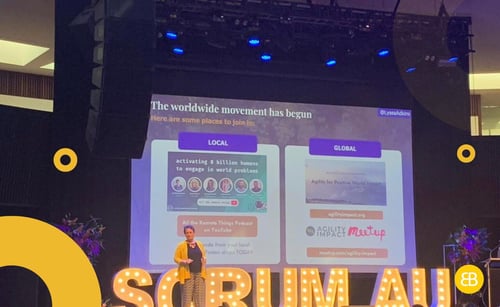
Agile frameworks
One of the great points that Lyssa Adkins made in her keynote presentation. Agile frameworks, such as Scrum, Kanban, and Lean, are intentionally incomplete. That is, they provide a set of guiding principles and practices, but they don't prescribe every detail of how a team should work. This intentional incompleteness is a feature of agile frameworks. It allows teams to tailor their approach to their specific context and needs, rather than trying to fit into a one-size-fits-all model. However, this also means that agile teams need to draw on practices and behaviours from other disciplines to fill in the gaps. For example, they might incorporate design thinking, user-centred design, or systems thinking into their approach to enhancing creativity, empathy, and problem-solving.
Taking Action – Cynefin for Agile Teams
After attending Adkins’ opening presentation, I participated in a workshop titled “Taking Action – Cynefin for Agile Teams” by Kynan Stewart Hughes and Stephen Reed. The workshop was centred on the Cynefin Framework, which offers decision-makers a “sense of place” to view their perceptions when dealing with a situation or problem. This framework helps to define which response is required for a given situation or problem. The Cynefin Framework has four categories: Obvious, Complicated, Complex, and Chaotic. The fifth sector, Disorder, fills the centre of the categories.
The workshop focused on using the Cynefin action form to design safe-to-fail experiments that leaders and teams would feel comfortable trying. Our group’s action was to bring the ‘Why’ into the centre of transformation. We proposed to work with seven senior leaders to create a personalized plan for why they must change their working, thinking, and leading actions. Our focus was the transformation centred on ‘Why’ leads to a higher success rate.
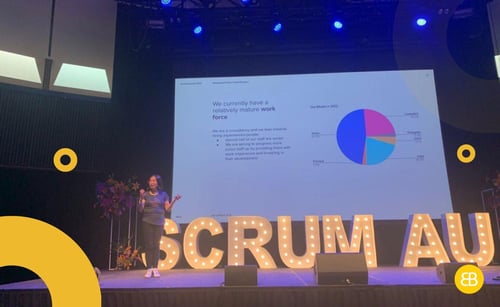
We also discussed expected signs of success, such as all people being able to explain the ‘Why’ and seeing positive energy. Amplification actions were also discussed, such as sharing the results of the experiment with other leaders. Possible signs of failure were identified, such as confusion still existing about the ‘Why’ and the experiment not being repeatable. Dampening actions, such as sharing insights with leaders in regular sync, were also discussed.
The major takeaway from the workshop was that the Cynefin action form is a powerful tool for getting approval and buy-in for agile improvement ideas. It turns every “no” into a “sure, why not?” By using the Cynefin action form, decision-makers can have a better understanding of the situation and choose the appropriate response. This allows for safe-to-fail experiments that leaders and teams will feel fine about trying.
Right after participating in Kynan Stewart Hughes and Stephen Reed’s workshop, I participated in a presentation by Lakshmi Easuwaran on “How can organizations enable value delivery/Customer-centric delivery.” This presentation provided valuable insights into how organizations can deliver value to their customers and improve their bottom line.
The presentation highlighted Scrum, a lightweight framework that helps people, teams, and organizations generate value through adaptive solutions for complex problems. The Scrum Value Delivery Framework consists of the Product Goal, Sprint Goal, and Definition of Done. To plan the work to be done each sprint, teams need an idea of their product’s overall objective. Each team may have multiple product goals over its lifetime, but only one at a time. Sprint Goals provide a specific and singular purpose for the sprint backlog, helping everyone focus on the essence of what needs to be done and why. The Definition of Done ensures that the standard for quality is met and that there is a shared understanding of what “done” means during the delivery of the increment
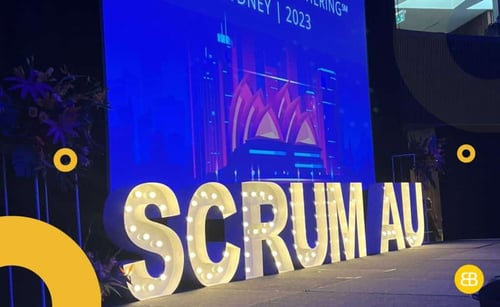
The presentation also discussed the importance of employee engagement and social value in delivering value to customers. Employee engagement and social value drivers such as productivity, work-life balance, employee retention, innovation, customer satisfaction, public reputation, and happy investors can improve the bottom line of organizations. The presentation provided recommendations to product teams on achieving a balance between permanent staff and contractors, over-communicating Objectives and Key Results (OKRs) every sprint to reinforce the product goal, and saying NO to fixed roadmaps. The presentation also recommended that product owners should always work with executive leadership to map metrics to value for traceability, baseline the metrics to understand the impact and validate the team is working on the right items, and create opportunities for teams to engage with customers.
The key takeaways from the presentation were to internalize the vision, understand the business value to be delivered, foster a team environment through employee engagement and social value drivers, deliver value, measure value delivery, and review, correct, and reprioritize. To achieve these key takeaways, the presentation recommended that organizations identify the vision and value to be delivered, translate the vision to business value and internalize it, make the team understand the business value to be delivered to achieve the vision, foster a team environment, serve the team, remove roadblocks, and motivate them to succeed.
Modern Agile Leadership Concepts for Frontline Leaders
Additionally, I had the privilege of attending a presentation by Peter Lee titled "Modern Agile Leadership Concepts for Frontline Leaders". The presentation focused on the importance of aligning leadership principles to create successful Agile teams and the unique challenges faced by frontline leaders in doing so. One of the key takeaways from the presentation was the need for leadership indoctrination in modern leadership principles. Without this, natural friction exists in the dynamics that create great Agile teams. In particular, there is often a misalignment between generalist skills and specialist skills in leadership, which can lead to misunderstandings and miscommunications.
Another challenge that was discussed was the need to move away from traditional bureaucratic and meritocratic views of companies and towards action-based organizations that align with Agile principles. This requires an organizational shift that supports new leadership tradeoffs. However, in a VUCA (volatile, uncertain, complex, and ambiguous) environment, pure efficiency-focused organizations may struggle. Focusing solely on efficiency doesn't make you more effective, but focusing on being effective will make you more efficient. It's important to "go slow to go fast" and prioritize effectiveness over efficiency.
The closing presentation of the first day was by Joseph Pelrine “Beyond the Buzzword - A psychologist's thoughts on psychological safety". The statement made by Joseph Pelrine during his presentation on psychological safety was quite intriguing. He pointed out that while psychological safety has become a popular topic in business circles, there is a lot of misinformation being spread about what it actually is and how it can be fostered. Pelrine, being a psychologist himself, addressed some common misconceptions about psychological safety and presented techniques that are used by psychologists to analyze it.
One point that Pelrine made was that many people who write and talk about psychological safety are not psychologists themselves. While they may have good intentions, their lack of expertise can lead to misunderstandings about the concept. Additionally, Pelrine mentioned a statistic that caught your attention, stating that 93.6% of people are more likely to believe something if it is prefaced with the phrase "research says."
Joseph’s Psycho-neuro-cognitive Buzzword Binge Slam
The second day of the conference I attended was a unique experience of participating in an Open Space, a self-organized forum, allowing participants to discuss any topics of interest in a mini-conference within the conference. During this session, I had the opportunity to participate in “Joseph’s Psycho-neuro-cognitive Buzzword Binge Slam” which helped me understand the concept of trust being the intersection of fear and hope.
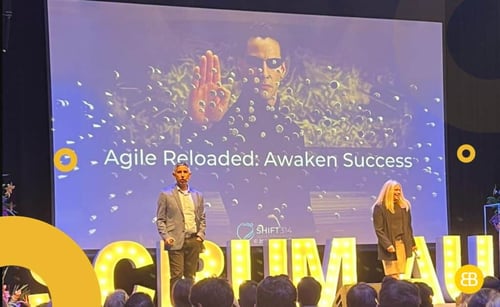
Pelrine also emphasized the importance of macro behaviour and culture in creating a supportive environment. An organizational culture that supports psychological safety can be achieved through transparent communication, clear expectations, and consistent feedback. On the micro level, individuals must be aware of their own behaviour and how it impacts others. By paying attention to their language, tone, and body language, individuals can create a more inclusive environment. The nuances of language were also discussed, highlighting how certain words and phrases can have negative connotations, even if their denotational meaning is neutral.
Building on Human-Centered Facilitation
Furthermore, James Zhang gave a compelling presentation on "Building on Human-Centered Facilitation" on day two of the event. One of the key points he raised was the results of a survey conducted by the Harvard Business Review (HBR), which showed that 65% of senior managers in various industries felt that meetings interfered with their ability to complete their own work, while 71% felt that meetings were unproductive and inefficient. Zhang also discussed common pitfalls that contribute to these issues, such as lack of preparation, unclear purpose, and inappropriate attendance.
Zhang emphasized the importance of human-centred facilitation in overcoming these challenges. He defined a human-centred facilitator as someone who prioritizes valuing all participants and helps to achieve positive outcomes. Overall, his presentation shed light on the problems that can arise in meetings and provided helpful strategies for creating more productive and effective gatherings.
Overall, my experience at Scrum Australia 2023 was incredibly enriching and engaging, and I came away feeling inspired and energized to continue exploring the world of agile project management. I look forward to applying the insights and ideas that I gained from the conference to my work and to contributing to the ongoing evolution of organizational practice.
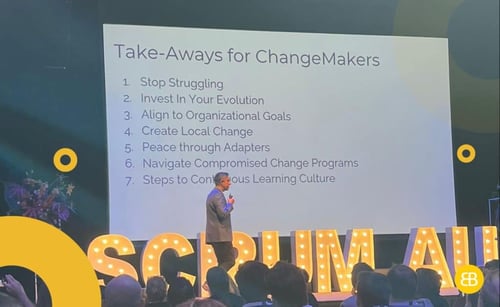

Sanjeena fosters an inclusive workplace, valuing employees and driving engagement. She cultivates a positive culture that promotes teamwork and growth.
Read more Articles by this Author